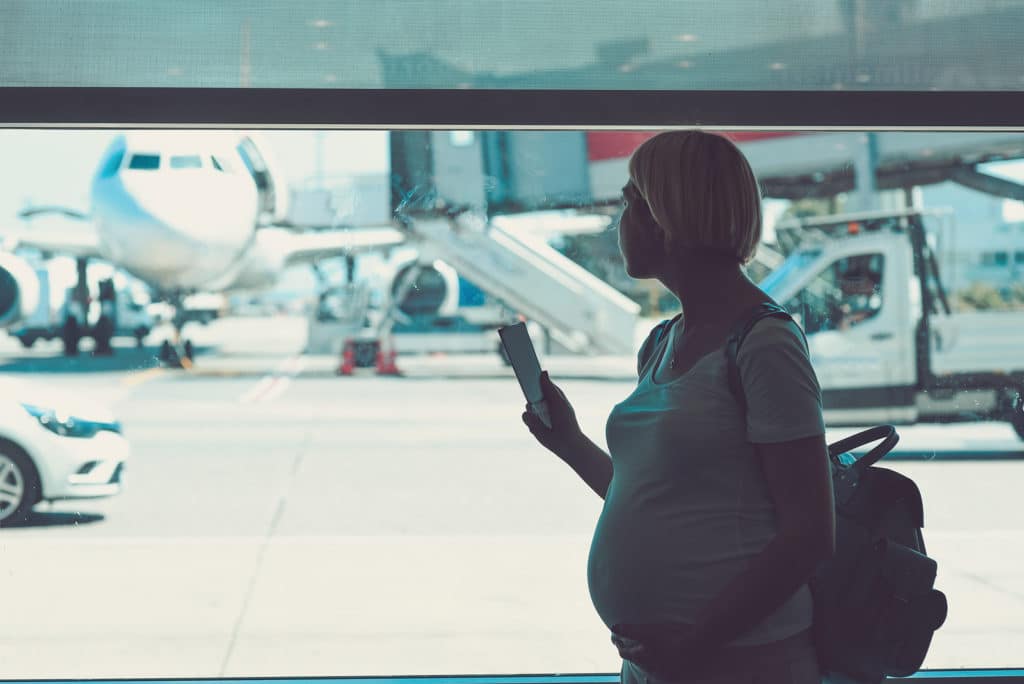
Pregnancy is a joyous experience for expecting mothers. Women’s bodies experience a wide range of changes throughout the term. The first few weeks are particularly crucial in understanding these changes and to ensure that the pregnancy is healthy. It doesn’t mean that you have to stop doing everything you enjoyed including travelling. Occasional flying while you are pregnant is likely safe with a few preparations.
According to the American College of Obstetricians and Gynecologists (ACOG), it is safe to travel until you are 36 weeks in a healthy pregnancy. The best time to travel is between 14 and 28 weeks, or during the middle of the pregnancy.
Most airline companies allow pregnant women to fly up to 36 weeks with certain policies and a medical certificate from the doctor. It’s best to check with your airline carrier ahead of time about their terms to avoid any last-minute panic.
Virus and Pregnancy Health Risks
These are some of the general practices for flying when pregnant but we live in different times now. In 2020, we witnessed the spread of coronavirus affecting lives worldwide. Though, there is no full proof evidence of its impact on unborn baby if pregnant women contract the virus, health experts like the CDC advises against any air travel during the COVID-19 pandemic.
The Centers for Disease Control and Prevention (CDC) also suggests pregnant women to avoid travelling to some destinations, especially those with Zika and Malaria risks.
Zika and Malaria
Pregnant women can contract the Zika virus through mosquito bites and sexual contact. The infection can cause severe birth defects in a pregnant woman. If you must travel to areas with the virus risk, don’t forget to take strict precautions to prevent any transmission of the virus into your body. (NCEZID and DGMQ, CDC 2020)
Malaria only spreads through mosquito bites. Malaria in pregnant women can create serious complications like premature birth, miscarriage or still birth. Consult your doctor about taking a drug to prevent it when you necessarily have to travel to places with Malaria risks. As a precautionary measure, wear an effective insect repellent as prescribed by the doctor.(NCEZID and DGMQ, CDC 2020)
Precautions and Tips While Travelling During Pregnancy
Always speak your doctor if you have a pre-existing medical condition or experiencing complications during the pregnancy. These conditions can worsen in transit so your doctor is likely to caution against any air travel. The duration of the flight journey is also important in determining whether or not you should travel.
When your doctor approves taking a flight and your plans are flexible, the ideal time to fly should be during your second trimester – the risks of common pregnancy emergencies are at its minimum. Follow these tips to stay safe and healthy:
- Wear comfortable clothes preferably loose outfits with flat shoes
- Sit on the aisle seat to stretch your legs and easy access to the restroom
- Get up from your seat to walk at 2 hour intervals
- Avoid eating gas-inducing foods and carbonated beverages before the flight
- Carry a water bottle and stay hydrated throughout the flight
- Keep healthy snacks handy during the travel
(Ernst 2018)
Apart from these, avoid touching common areas surfaces and wash your hands properly or sanitize them at frequent intervals. Masks, PPE, a face shield, etc. are also compulsory in most of the airlines.
Before your travel, its advised to research the closest hospital at your destination in case of emergency. Keep a copy of your prenatal records handy if the other doctor needs to refer to it. (Ernst 2018)
Travelling to An International Destination
International travel is high-risk at any stage during pregnancy since both travel and pregnancy can be unpredictable. Taking extra precautions is a must if an international journey is on your schedule. Speak to your gynaecologist and discuss your case in detail ahead of your flight.
It’s advised not to fly internationally if:
- It’s your first pregnancy and you age 35 or older or 15 and under.
- Recent or past placental abnormalities
- You have risk, history of miscarriage or any vaginal bleeding
- Ectopic pregnancy – when a fertilized egg embeds outside the uterus
- Premature labor or premature membrane rupture
- Diabetes, preeclampsia in pregnancy or high blood pressure
(Pathak 2021)
Your doctor will also likely discourage travel:
- To high altitudes, over 12,000 feet
- To places with serious disease outbreaks
- If your destination requires live virus vaccines for protection
(Pathak 2021)
Final Thoughts
Knowing all that you now know, is it safe to fly while pregnant? That is a very personal choice to be considered very intentionally with your physician. Taking precautions and traveling early in your pregnancy will create less risk. We value your life and the life of your baby and want to bring you the most up to date information on how to care for yourself during this special time. Let the stork fly the final trimester for you!
Works Cited
NCEZID, National Center for Emerging and Zoonotic Infectious Diseases, and Division of Global Migration and Quarantine DGMQ. “Pregnant Travelers.” CDC.gov, 21 Dec. 2020, wwwnc.cdc.gov/travel/page/pregnant-travelers.
Ernst, Holly. “Is It Safe to Fly When Pregnant?” Healthline.com, 20 July 2018, www.healthline.com/health/pregnancy/can-you-fly-when-pregnant.
Pathak, Neha. “5 Tips to Stay Safe When Flying While Pregnant.” WebMD, WebMD, 19 Mar. 2021, www.webmd.com/baby/taking-to-the-skies-pregnant-and-safe#1.
